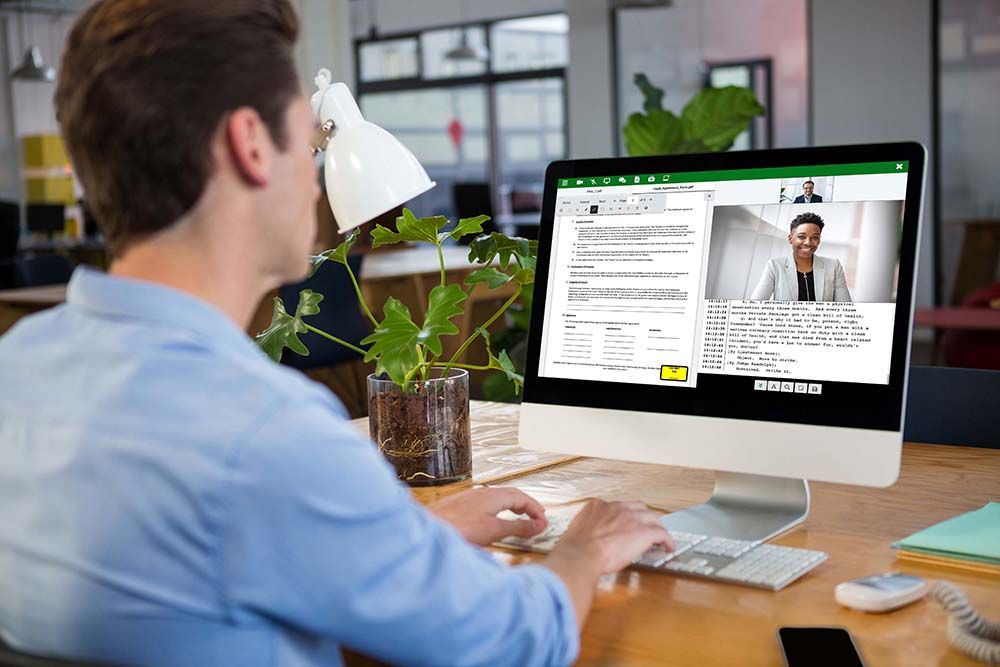Why Remote Depositions Are Necessary for Modern Legal Practices
Why Remote Depositions Are Necessary for Modern Legal Practices
Blog Article
Navigating the Future of Legal Proceedings With Seamless Remote Depositions Solutions
As modern technology continues to development, the integration of seamless services for remote depositions has ended up being essential for lawful experts seeking reliable and affordable ways to conduct depositions. By exploring the complexities of navigating the future of lawful proceedings through smooth remote deposition remedies, a more clear understanding of the possibilities and complexities that exist in advance can be gotten.
The Increase of Remote Depositions
This change has actually been primarily driven by the demand for versatility, performance, and cost-effectiveness in lawful process (REMOTE DEPOSITIONS). Remote depositions allow lawyers, witnesses, and court reporters to take part from different locations, removing the demand for physical existence in a details deposition room.
Moreover, the advancements in video clip conferencing platforms and electronic tools have actually enhanced the total experience of remote depositions, making certain clear audio-visual communication and secure paperwork of testimonies. Lawyers now have the option to effortlessly arrange, record, and transcribe depositions with ease, enhancing the whole process.
As modern technology remains to evolve, remote depositions are expected to come to be also a lot more widespread in the legal industry, using a convenient and effective service for performing depositions in a busy and interconnected world. (REMOTE DEPOSITIONS)
Advantages of Seamless Innovation Assimilation
How does seamless innovation combination enhance the effectiveness and performance of remote depositions in the lawful sector? Seamless modern technology combination plays an essential role in simplifying remote depositions, providing a myriad of advantages to attorneys. By effortlessly integrating modern technology right into the deposition procedure, attorneys can perform depositions easily, no matter of the participants' physical locations. This assimilation permits real-time interaction, document sharing, and cooperation, fostering a more effective and efficient deposition experience.
Additionally, seamless technology assimilation allows secure and trusted information transmission, making certain that delicate information shared throughout depositions is protected. Advanced attributes such as virtual exhibits, electronic trademarks, and video clip conferencing improve the general effectiveness of remote depositions, imitating the in-person experience with included comfort. Additionally, the integration of transcription solutions and AI-powered tools can better simplify the deposition procedure, conserving time and decreasing the margin of mistake.

Overcoming Challenges in Online Procedures
To properly navigate digital process, legal professionals must deal with and get over various difficulties that develop in the digital environment. One of the main challenges faced in digital procedures is making certain protected interaction and data protection. With sensitive details being shared online, preserving client privacy and preventing information breaches is extremely important. In addition, technological difficulties such as poor web link or audio/video issues can interfere with the click site circulation of procedures and impact the high quality of communications between participants. Attorneys need to additionally adjust to the absence of physical presence, which can prevent non-verbal cues and communication nuances vital in legal contexts. Moreover, maintaining involvement and emphasis in virtual settings can be challenging for both legal groups and witnesses, possibly impacting the effectiveness of the procedures. To reduce these difficulties, lawyers must spend in trustworthy technology, establish clear protocols for virtual procedures, give training on virtual decorum, and make certain backup strategies are in location to attend to technological problems promptly. By proactively addressing these obstacles, lawyers can enhance the effectiveness and performance of online process.
Ensuring Safety and Compliance Procedures
In the world of lawful proceedings, safeguarding safety and security and making sure conformity actions is of vital relevance for preserving trust and upholding the integrity of the procedure. With the change in the direction of remote depositions, guaranteeing the security and confidentiality of delicate info traded throughout these procedures is critical. To achieve this, attorneys need to take advantage of safeguard online systems that provide end-to-end security, safe accessibility controls, and compliance with industry laws such as HIPAA and GDPR.

Future Trends in Legal Technology Combination
As the legal landscape continues to develop with remote deposition solutions stressing protection and compliance, the assimilation of innovative lawful technologies is poised to form future trends in the lawful sector. AI-powered tools can aid in legal research study, contract analysis, and also forecasting case outcomes based on historic data.
Furthermore, cloud-based options are coming to be significantly popular in the lawful market. Cloud technology uses boosted adaptability, scalability, and ease of access, allowing legal additional info experts to work collaboratively from anywhere with a web link. This pattern not only click boosts effectiveness but likewise advertises cost-effectiveness by minimizing the demand for physical facilities and maintenance.
Furthermore, blockchain innovation is making its way right into legal technology combination, supplying safe and transparent means to deal with delicate info, enhance transactions, and verify the authenticity of lawful files. By welcoming these future trends in legal tech integration, legislation companies can stay in advance of the curve, enhance customer services, and adjust to the altering demands of the industry.
Verdict
Finally, the assimilation of smooth remote deposition remedies has actually reinvented lawful proceedings by providing numerous advantages such as raised performance, cost-effectiveness, and access. In spite of facing challenges in virtual procedures, developments in technology remain to deal with safety and security and compliance problems (REMOTE DEPOSITIONS). As the legal market welcomes more integration of innovation, future trends aim in the direction of a much more structured and efficient lawful procedure
Report this page